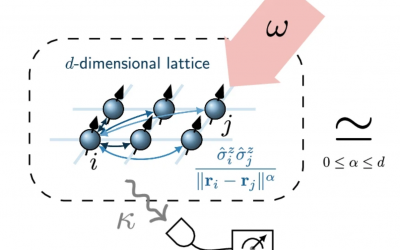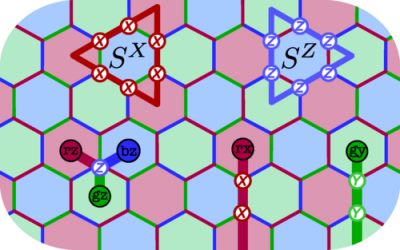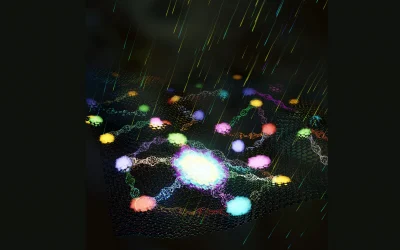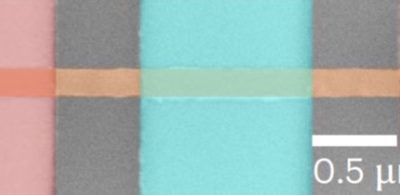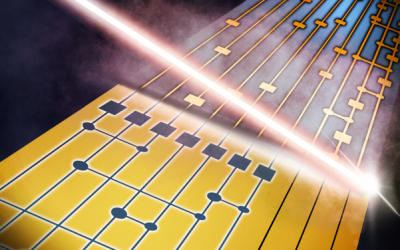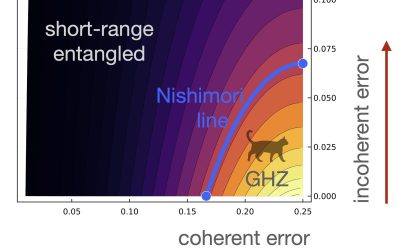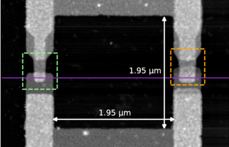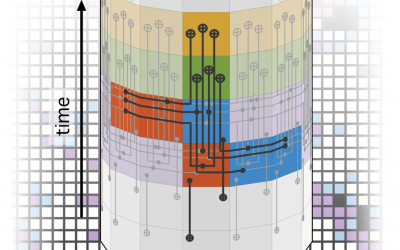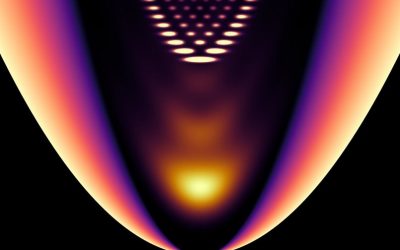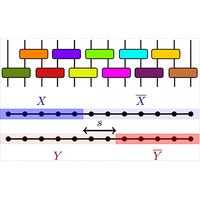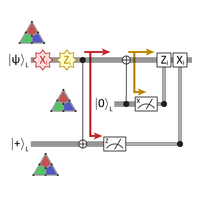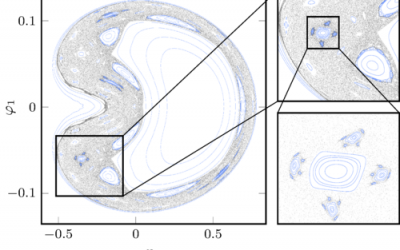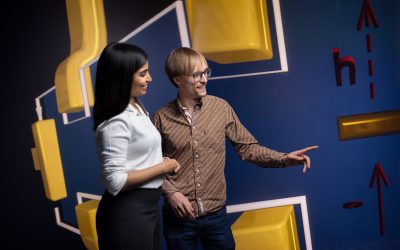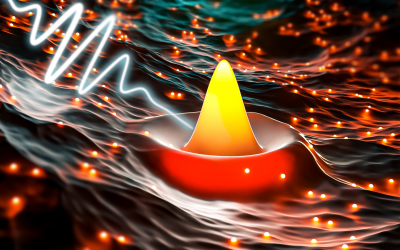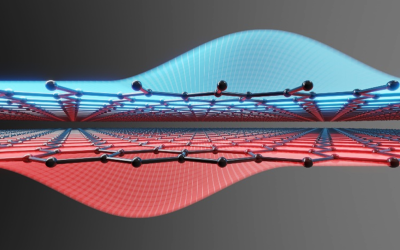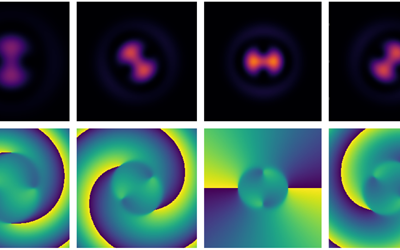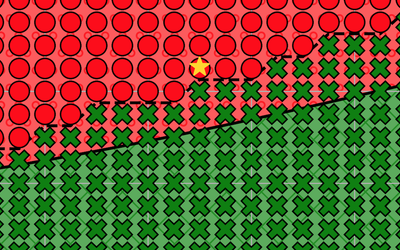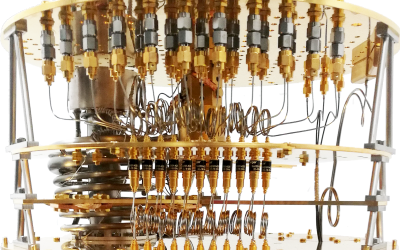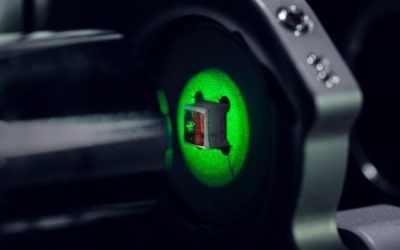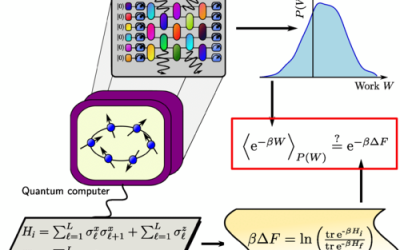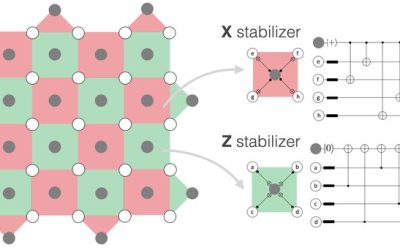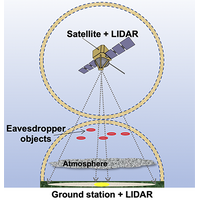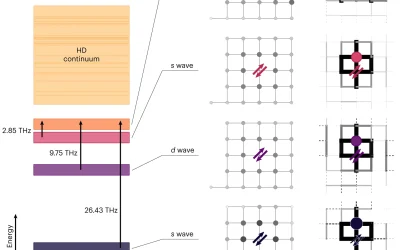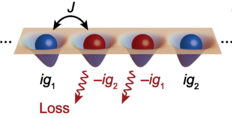Publication highlights
New toolbox helps tackle dynamics in long-range interacting particles
New toolbox helps tackle dynamics in long-range interacting particles Latest research from the Turkheshi Group based at THP Cologne tackles a key challenge in quantum science: understanding how groups of particles behave when they're being monitored and interact with...
New Quantum Error Correction Code Published in PRX Quantum
New Quantum Error Correction Code Published in PRX Quantum In a collaboration of the team of Markus Müller at RWTH Aachen and FZJ with Jens Eisert’s group in Berlin, the team has completed a new work in quantum error correction, published in PRX Quantum: The work...
Exploring Quantum Geometry with Terahertz Light: A Breakthrough in Twisted Bilayer Graphene
Exploring Quantum Geometry with Terahertz Light: A Breakthrough in Twisted Bilayer Graphene A recent groundbreaking study led by ICFO researchers, in collaboration with several international research groups, has uncovered previously unseen behaviors in magic-angle...
Insights into the Spread of Quantum ‘Magic’ in Large Systems
Insights into the Spread of Quantum 'Magic' in Large Systems ML4Q associated member, Xhek Turkeshi, explores how "magic" — which is essential for performing complex quantum computations — spreads and develops in systems of quantum bits (qudits). Magic helps quantify...
New Fabrication Method Brings Topological Quantum Computing a Step Closer to Reality
New Fabrication Method Brings Topological Quantum Computing a Step Closer to Reality Physicists at the University of Cologne have revealed a key superconducting effect in topological insulator nanowires. Their findings bring topological insulators closer to...
Calculating error-free more easily with two codes
Calculating error-free more easily with two codes Quantum computer fixes errors with two different error correction codes Various methods are used to correct errors in quantum computers. Not all operations can be implemented equally well with different...
New paper in Nature Physics: Nishimori transition across the error threshold for constant-depth quantum circuits
New paper in Nature Physics: Nishimori transition across the error threshold for constant-depth quantum circuits Guo-Yi Zhu from Simon Trebst’s group at the University of Cologne, in collaboration with IBM Quantum, demonstrated the generation of long-range...
Unlocking the Potential of Transmon Qubits: New Research on Quasiparticle Effects
Unlocking the Potential of Transmon Qubits: New Research on Quasiparticle Effects A recent study from the Ando Lab at the University of Cologne and the Catelani group in Jülich sheds light on the magnetic field dependence of quasiparticle tunneling in aluminum...
Trebst Group Develops Robust Protocol for Surface Code Teleportation
Trebst Group Develops Robust Protocol for Surface Code Teleportation A new protocol for teleporting surface codes could pave the way for advancements in fault-tolerant quantum computing, bringing many-qubit teleportation closer to reality. The concept of...
Advancing Quantum Error Correction: New Threshold Estimation Method
Advancing Quantum Error Correction: New Threshold Estimation Method A joint study between M. Müller's and S. Diehl's groups appears today in Physical Review Research introducing a novel method for accurately estimating error thresholds in quantum error...
Quantum Error Correction: Insights from Quantum Cellular Automata
Quantum Error Correction: Insights from Quantum Cellular Automata A new study published in Physical Review Letters shows how quantum cellular automata can autonomously correct quantum errors, offering a novel approach for building scalable quantum computers....
Investigating Dimensionality Effects in Photon Gases
Investigating Dimensionality Effects in Photon Gases Researchers from the University of Bonn and the University of Kaiserslautern-Landau (RPTU) explore the behavior of photon gases, revealing new insights into how dimensionality influences phase transitions....
Schmitt and Weitz Groups Shape Super Photons for Secure Quantum Communication
Schmitt and Weitz Groups Shape Super Photons for Secure Quantum Communication A method developed at the University of Bonn could have potential applications for tap-proof communication. Thousands of light particles can merge into a type of “super photon”...
Beyond Thermalization: New Insights into Quantum System Dynamics
Beyond Thermalization: New Insights into Quantum System Dynamics ML4Q professor, David Luitz, contributes to a study on quantum system dynamics revealing unique correlations in chaotic quantum systems that are essential for understanding the nature of quantum...
Improving Quantum Error Correction Performance with Steane’s Scheme
Improving Quantum Error Correction Performance with Steane's Scheme Joint work between the Müller group and the trapped-ion quantum computing group at Innsbruck successfully implements a scheme by Steane that enhances the performance of quantum error...
Classical Chaos in Quantum Computers Reviewed
Classical Chaos in Quantum Computers Reviewed ML4Q members DiVincenzo, Trebst and Altland highlight in this review how classical chaotic behavior can influence quantum systems and offer new ways to understand and control this unpredictability. As quantum...
A breakthrough on the edge: New topological qubit developments published in Nature Physics
It is widely recognized that magnetization and superconductivity are typically mutually exclusive. However, the study by Uday and co-workers provides compelling evidence for the presence of superconducting correlation within the chiral edge mode of proximitized QAH...
Perturbations simplify the study of “super photons”
Perturbations simplify the study of “super photons” A study by the University of Bonn gives novel insight into properties which are often difficult to observe Thousands of particles of light can merge into a type of “super photon” under suitable conditions. Physicists...
Negative electronic compressibility in charge islands in twisted bilayer graphene
Negative electronic compressibility in charge islands in twisted bilayer graphene New report from the Stampfer group in cooperation with the Kennes group on negative electronic compressibility in twisted bilayer graphene In a recent paper by the Stampfer and Kennes...
Fiber Lab Develops Quantum Gas Microscope with Depth Perception
ML4Q Fiber Lab Develops Quantum Gas Microscope with Depth Perception In a publication in Physical Review A, the ML4Q Fiber Lab presents the development of a quantum gas microscope that can pinpoint the horizontal and vertical positions of atoms arranged in a lattice....
Novel Approach to Quantum Error Correction – Results Published in PRX Quantum
Novel Approach to Quantum Error Correction - Results Published in PRX Quantum The group of Markus Müller presents a novel approach to quantum error correction that eliminates the need for traditional measurements, which are usually required to detect and correct...
Fundamental Equation for Superconducting Quantum Bits Revised
Fundamental Equation for Superconducting Quantum Bits Revised Quantum bits can be described more precisely with the help of newly discovered harmonics as a team of 30 researchers reports in Nature Physics. Researchers at the University of Cologne, in a...
A Tale of Three Papers: Julian Schmitt looks back on his scientific journey over the past four years
Julian Schmitt looks back on his scientific journey over the past four yearsA Tale of Three Papers Julian Schmitt looks back on his scientific journey over the past four years Explore the world of quantum optics and photon Bose-Einstein condensates as we...
This month in Physical Review X: Quantum computers to test for the first time Jarzynski’s equality for many interacting particles
Quantum computers to test for the first time Jarzynski’s equality for many interacting particles Joint efforts including the Luitz (Bonn) and Rizzi (Cologne/Jülich) Groups yield results published in Physical Review X earlier this month Statistical mechanics is...
Qubit fractionalization induced by coherent errors and weak measurements
Qubit fractionalization and emergent Majorana liquid in the honeycomb Floquet code induced by coherent errors and weak measurements Use the slider to read the story of this paper as Simon Trebst summarizes it in 6 images: In quantum error correction,...
Satellite-Based Quantum Key Distribution in the Presence of Bypass Channels
ML4Q associated member and Independence Grant Fellow, Frederico Grasselli (Bruss group, HHU Düsseldorf) co-authored a paper which was published on November 1st in PRX Quantum. In the joint work, the authors explore the security of discrete- and continuous-variable QKD...
Michael Buchhold co-authors a Nature Physics paper on a Hubbard exciton fluid in Mott insulators
Michael Buchhold co-authors a Nature Physics paper on a Hubbard exciton fluid in Mott insulators A Hubbard exciton fluid in a photo-doped antiferromagnetic Mott insulator is the title of a paper arising from a cooperation between ML4Q member, Michael Buchhold...
Today on arXiv: Joint work by the Trebst group together with IBM Quantum on Nishimori transition
Today on arXiv: Joint work by the Trebst group together with IBM Quantum on Nishimori transition Update: The preprint was published on November 15 in Phys. Rev. Lett.Nishimori’s Cat: Stable Long-Range Entanglement from Finite-Depth Unitaries and Weak...
Topological states of light and matter in systems with trivial band structures
Topological states of light and matter in systems with trivial band structures Topological states of light and matter don't always require complicated lattice band structures. In their joint work, ML4Q members Julian Schmitt and Stefan Linden were able to...
Conference key agreement in a quantum network
ML4Q associated member and Independence Grant Fellow, Frederico Grasselli (Bruss group, HHU Düsseldorf) co-authored a paper which was published a few days ago in npj Quantum Information. The publication is a collaboration with Alexander Pickston, Joseph Ho,...
